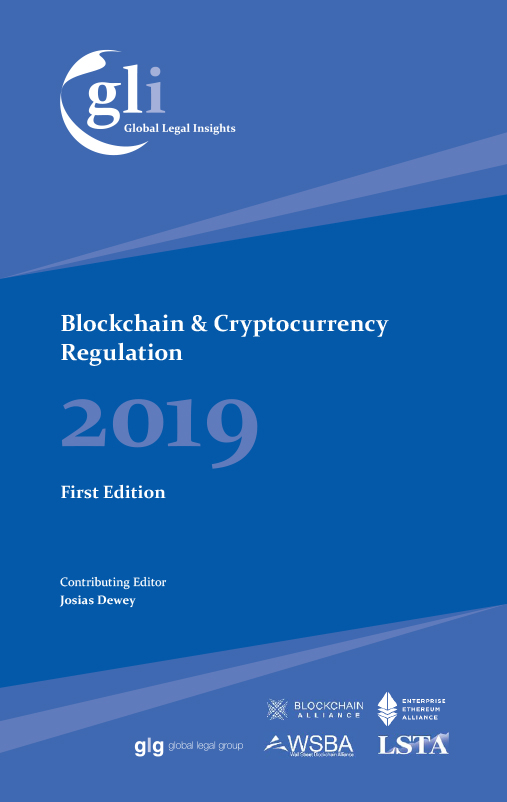An Introduction to Virtual Currency Money Transmission Regulation
 Blank Rome Partners Grant Buerstetta and Michelle Ann Gitlitz, who both serve as co-chairs of the Firm’s Blockchain Technology & Digital Currencies group, authored the chapter on “An Introduction to Virtual Currency Money Transmission Regulation” in Blockchain & Cryptocurrency Regulation 2019 (Global Legal Insights, Sept. 2018).
Blank Rome Partners Grant Buerstetta and Michelle Ann Gitlitz, who both serve as co-chairs of the Firm’s Blockchain Technology & Digital Currencies group, authored the chapter on “An Introduction to Virtual Currency Money Transmission Regulation” in Blockchain & Cryptocurrency Regulation 2019 (Global Legal Insights, Sept. 2018).
In their chapter, Michelle and Grant provide an introductory overview to virtual currency money transmission regulation and specifically discuss federal and state virtual currency money transmissions as well as attempts to standardize licensing practices. (See "Introduction" chapter excerpt below.)
Blockchain & Cryptocurrency Regulation 2019 covers government attitude and definition, cryptocurrency regulation, sales regulation, taxation, money transmission laws and anti-money laundering requirements, promotion and testing, ownership and licensing requirements, mining, border restrictions, and more.
To read the full chapter, please click here.
To download the full PDF chapter, please click here.
Introduction
The proliferation of virtual currencies, and activities relating to this new asset class, including how businesses are looking to incorporate blockchain payments to quickly and seamlessly effectuate remittances to locations around the world, raises significant compliance issues with respect to money transmission laws and regulations. This treatise chapter examines when business in the virtual currency arena may be obligated to comply with both U.S. federal and state money transmission laws and regulations.
On the federal level, the Financial Crimes Enforcement Network (“FinCEN”), a division of the U.S. Department of the Treasury, exercises regulatory authority pursuant to the Currency and Financial Transactions Reporting Act of 1970, as amended by Title III of the USA PATRIOT Act of 2001 and other legislation, which legislative framework is commonly referred to as the Bank Secrecy Act (“BSA”). The BSA is a comprehensive federal anti-money laundering (“AML”) and counter-terrorism financing (“CTF”) statute. FinCEN is charged with protecting the financial system from being used for money laundering and to prevent terrorism financing. Accordingly, the federal government is primarily concerned with preventing criminals from laundering money or otherwise participating in illegal financial activities. The laws are in place to allow FinCEN to manage the collection, processing, storage, dissemination, and protection of data filed pursuant to its reporting requirements in order to monitor personal information or transactional data.
The data is analyzed by FinCEN, which allocates its resources to the areas that pose the greatest financial crime risk. FinCEN also shares information with foreign financial intelligence unit counterparts on AML and CTF efforts. Specifically, FinCEN recently announced that it is sharing its experience on virtual currency with foreign partners through the Egmont Group of Financial Intelligence Units (“FIU”) and other international forums. The goal is to help FIUs better advise reporting entities on what to report about virtual currency transactions or activity and other relevant information for revealing important methods and constituents involved in financing illicit activities.
In addition to the federal regime, any entity operating in the virtual currency arena must also consider the intricate (and often confusing) web of state money transmission laws with which they may have to comply. State money transmission regulations are not aimed at protecting against money laundering and terrorist financing; they focus on consumer protection to ensure that a money transmitter will not lose, steal, or misdirect the consumer’s money. Virtually every state has its own money transmission licensing regime, which is inefficient, particularly in the context of virtual currency businesses whose technologies and products may operate fluidly across state lines.
The maze of state licensing regulations, paired with FinCEN’s federal requirements, demand thoughtful consideration of legal compliance for any person or business who operates in the virtual currency industry and may be considered a money transmitter. •
(Click here to continue reading.)

